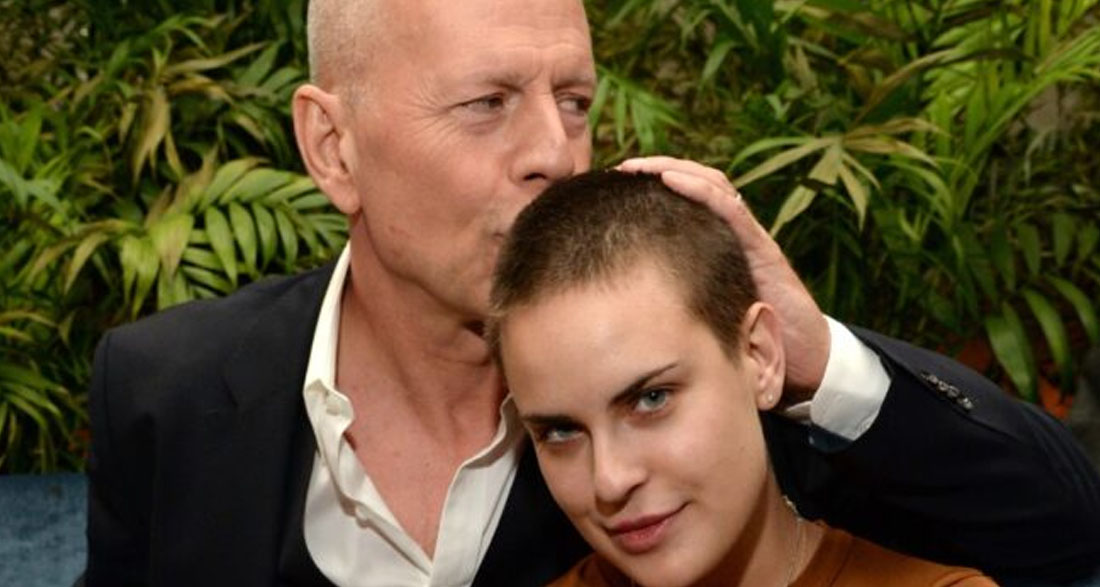Tallulah Willis, the youngest daughter of Demi Moore and Bruce Willis, has opened up about a personal diagnosis of her own, inspired by her father’s public struggle with frontotemporal dementia.
The 30-year-old recently shared a heartwarming childhood moment with her dad, which led to an important conversation about autism. Keep reading to find out more about Tallulah’s diagnosis and the impact it has had on her life.
A Childhood Moment That Sparked a Conversation
Tallulah shared a sweet clip on Instagram, showing a young version of herself sitting in her dad’s arms on a red carpet at a film premiere. In the video, she’s playfully messing with Bruce Willis’ head while he talks to the media. She captioned the post on March 15th with the words, “tell me your autistic without telling me your autistic [sic].”
The video quickly caught the attention of her 408,000 followers, many of whom praised the touching moment. Some also noticed behaviors in the clip that are associated with autism, while others focused on how Bruce Willis lovingly reacted to his daughter’s playful actions.
One fan commented, “The beautiful way he just wasn’t even phased by that and just continued to hold you. Your dad is one-of-a-kind honey, and so are you.” Another wrote, “In your defense, shaved heads are as relaxing as little Japanese sand zen gardens.”
A third fan added, “His care for your feelings is magic… I’m so happy you have moments captured in the vault of forever.” These comments showed just how much love and admiration fans have for Tallulah and her father’s relationship.
A Life-Changing Diagnosis
One of the most notable comments came from a psychologist who specializes in neurodivergent conditions. They asked, “If you’re open to sharing, did you get diagnosed as a child?” and continued, “Not sure how much of your journey you’ve shared but would love to read more. You’re brave and inspiring and this is a very sweet video. All the best!”
Tallulah responded to the question, revealing a surprising personal truth. “This is the first time I’ve ever publicly shared my diagnosis. Found out this summer and it’s changed my life,” she wrote. This was the moment she openly acknowledged her autism diagnosis, and it’s clear it had a profound impact on her.
Understanding Autism and Stimming
Autism spectrum disorder (ASD) is a developmental condition that can affect how people communicate and interact with others. It also involves behaviors that can seem repetitive or restrictive.
In the Instagram comments, Tallulah’s sister, Scout LaRue Willis, explained why the clip was so significant to Tallulah’s condition. “She’s stimming,” Scout wrote, referring to a behavior where people with autism repeat certain movements to help them manage sensory input.
Tallulah responded by noting a particularly memorable moment in the video. “Dude the ear curl,” she wrote, referring to the sweet moment when she playfully folded her father’s ear while he smiled at her. “I wish we had stronger audio,” she added, showing her fondness for the memory.
Supporting Her Father Through His Battle
Along with her sisters, Scout LaRue and Rumer Willis, Tallulah has been incredibly supportive of her father, Bruce Willis, as he faces his own health challenges.
In 2023, Bruce was diagnosed with frontotemporal dementia (FTD), a condition that affects communication and behavior rather than memory. One of the early signs of FTD was aphasia, which makes it difficult for people to communicate, write, or understand language.
Since the diagnosis, Bruce’s family has been a strong source of support, offering their love and care during this difficult time. Tallulah’s stepmother, Emma Hemming Willis, shared a heartfelt message about her husband, writing, “Just like you, we simply adore him.
What you might not know, but maybe you could imagine, that being wrapped in his arms is the safest place in this whole wide world… He’s a true gentle-man. With so much love to give and share. That’s what I get to see, his true core. I can tell you, it’s so pure and ever so good.”
Moving Forward
As of now, Tallulah has not shared more details about her autism diagnosis, but the post has sparked an important conversation about neurodivergence. By sharing her experience, she’s opened up a space for others to feel seen and understood, and it’s clear that her journey is an inspiration to many.
What do you think of this story? Please share your thoughts with us, and don’t forget to share it with others so we can hear what they think too!

